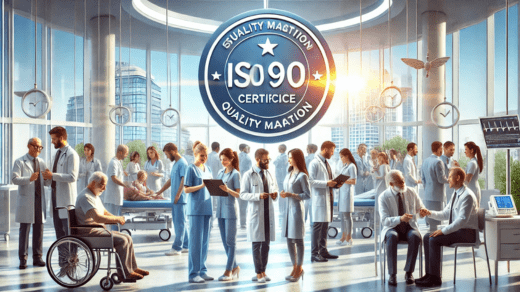In the rapidly evolving healthcare landscape, organizations are continually seeking ways to enhance their service delivery, ensure patient safety, and comply with regulatory requirements. One effective strategy is to obtain ISO certifications such as ISO 9001 (Quality Management System – QMS), ISO 14001 (Environmental Management System – EMS), ISO 27001 (Information Security Management System – ISMS), and ISO 45001 (Occupational Health and Safety – OH&S). These internationally recognized standards provide frameworks that can significantly improve healthcare operations. This article explores the key benefits of each certification with specific healthcare examples.
ISO 9001: Quality Management System (QMS)
ISO 9001 sets the foundation for a Quality Management System (QMS), emphasizing patient satisfaction and continuous improvement. Here are three notable benefits of ISO 9001 certification in healthcare:
- Enhanced Patient Satisfaction: By implementing ISO 9001, healthcare organizations can systematically gather and analyze patient feedback. For instance, a hospital may utilize patient satisfaction surveys to identify areas for improvement, leading to enhanced service quality and patient care.
- Improved Operational Efficiency: ISO 9001 encourages healthcare providers to review their processes for delivering care. For example, a clinic might streamline appointment scheduling and patient flow, resulting in reduced wait times and increased patient throughput.
- Credibility and Trust: Achieving ISO 9001 certification demonstrates a commitment to quality care, which can enhance a healthcare organization’s reputation. Patients are more likely to trust certified institutions, potentially leading to increased patient volumes.
ISO 14001: Environmental Management System (EMS)
ISO 14001 provides a framework for managing environmental responsibilities in healthcare settings. Here are three key advantages of ISO 14001 certification:
- Sustainability Commitment: Healthcare organizations certified under ISO 14001 can demonstrate their commitment to minimizing environmental impacts. For example, a hospital might implement waste reduction strategies, such as recycling medical waste and reducing single-use plastics, improving its environmental footprint.
- Regulatory Compliance: By adopting ISO 14001, healthcare organizations can ensure compliance with environmental regulations, such as proper disposal of hazardous materials. This proactive approach reduces the risk of legal issues and associated penalties.
- Cost Savings: Implementing resource-efficient practices under ISO 14001 can lead to significant cost savings. For instance, a healthcare facility might reduce energy consumption through energy-efficient lighting and HVAC systems, resulting in lower utility bills.
ISO 27001: Information Security Management System (ISMS)
ISO 27001 establishes a comprehensive Information Security Management System (ISMS) crucial for protecting sensitive patient information. Here are three key benefits of ISO 27001 certification in healthcare:
- Enhanced Data Security: ISO 27001 provides a structured approach to managing information security risks, reducing the likelihood of data breaches. For example, a healthcare organization can implement strict access controls and encryption for electronic health records (EHRs) to safeguard patient information.
- Building Patient Trust: Achieving ISO 27001 certification signals a strong commitment to data protection, which fosters trust among patients and stakeholders. Patients are more likely to choose healthcare providers that prioritize their privacy and security.
- IT Administrator Expertise: The successful implementation and maintenance of ISO 27001 can greatly benefit from skilled IT administrators. Their expertise in managing cybersecurity threats and developing security policies is essential for ensuring compliance and protecting sensitive data.
ISO 45001: Occupational Health and Safety (OH&S)
ISO 45001 focuses on creating an Occupational Health and Safety (OH&S) management system, promoting a safe working environment for healthcare staff. Here are three advantages of ISO 45001 certification:
- Reduction in Workplace Incidents: ISO 45001 helps healthcare organizations identify hazards and implement safety measures effectively. For example, a hospital may conduct regular safety drills and training sessions to minimize the risk of injury among healthcare workers, particularly in high-risk areas like emergency departments.
- Improved Employee Well-being: Achieving ISO 45001 certification reflects a commitment to employee health and safety. This focus can lead to higher morale and job satisfaction among healthcare staff, which ultimately translates to better patient care.
- Legal Compliance and Risk Mitigation: ISO 45001 certification assists healthcare organizations in complying with health and safety regulations, reducing the risk of legal issues and financial penalties. This proactive approach promotes a culture of safety and protects the organization’s reputation.
Conclusion
ISO certifications, including ISO 9001, ISO 14001, ISO 27001, and ISO 45001, offer significant benefits for healthcare organizations looking to improve quality, sustainability, information security, and employee safety. These certifications not only enhance patient satisfaction and operational efficiency but also establish a competitive edge in the healthcare marketplace.
Investing in ISO 9001 helps healthcare providers focus on quality care and patient loyalty, while ISO 14001 emphasizes environmental responsibility. ISO 27001 improves data security and builds patient trust, supported by knowledgeable IT administrators. Finally, ISO 45001 fosters a safe working environment and enhances employee well-being.
In the ever-evolving healthcare sector, pursuing ISO certifications is not just about compliance; it is a strategic investment in long-term success. By committing to these internationally recognized standards, healthcare organizations can enhance their operational performance, build a strong reputation, and position themselves for sustainable growth and excellence in patient care.

